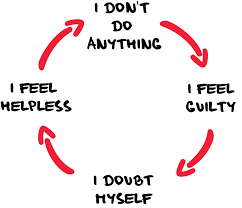How many times have you been so stressed out that you could not even get up from your bed? As a result, all of the thoughts running through your head were preventing you from doing anything. This is stress paralysis and it can be detrimental to both mental and physical health. In this blog post, we will discuss how to stop stressing about work or school and start enjoying life again.
Contents
- 1 What Is Stress Paralysis?
- 1.1 Causes Of Stress Paralysis
- 1.2 Symptoms Of Stress Paralysis
- 1.3 What Is Anxiety Paralysis Procrastination?
- 1.4 Symptoms Of Anxiety Paralysis Procrastination
- 1.5 What Is Anxiety Paralysis Attack?
- 1.6 Causes Anxiety Paralysis Attacks
- 1.7 Common Causes Of Stress Paralysis
- 1.8 Some Tips To Reduce Stress Paralysis Symptoms
- 1.9 How To Handle Stress Paralysis?
- 1.10 Treatment Options For Stress Paralysis
- 2 Conclusion
What Is Stress Paralysis?
Stress paralysis is a condition that can happen when you’re feeling overwhelmed and stressed. Your mind may start to play tricks on you, making it difficult to think or move forward. This can lead to feelings of anxiety, frustration, and hopelessness. You may feel like you’re stuck in a rut and unable to break free.
It is a paralyzing fear that can immobilize you and keep you from taking action or moving forward. It’s often caused by excessive stress, anxiety, or worry, which can lead to negative thoughts and a sense of dread. As a result, you may feel like you’re unable to do anything due to the overwhelming fear and uncertainty.
Causes Of Stress Paralysis
Stress paralysis is a temporary but reversible neurological disorder. It is caused by extreme stress and/or too much work. This can make the body’s central coordination of movement not work well. In other words, it’s a physical response to intense psychological distress.
Suddenly, one loses the ability to move voluntarily – your muscles are essentially ‘stuck’ in place. You may be able to jerk or spasm involuntarily as you struggle against it. It usually lasts for only a few seconds before the effects wear off and movement becomes possible again – but not always.
The key here is that one must learn how to handle stress better in order to prevent this from happening again.
Some Additional Facts About Stress Paralysis
- There is no physiological reason why someone can’t move during a paralysis episode.
- This disorder is different from sleep paralysis, as one is completely unconscious during an SP episode and remains immobile.
- The person experiencing an attack of PP may not be able to speak; they may grunt, groan or scream involuntarily as their body fights against the ‘paralysis.’
- Stress provocation, this condition is brought on by intense stress and/or fatigue but it isn’t attributed to any other medical causes it can usually be resolved in time.
- Stress is a situation that causes someone to feel pressured, worried, or strained. When the stress becomes overwhelming, it can result in negative health effects such as fatigue and headache.
- Stressful work environments are a major cause of a person’s inability to cope with stress which can lead to depression and anxiety if not treated accordingly.
- In working, stressful conditions may have an adverse effect on employees’ productivity as well as their mental and physical wellbeing.
Symptoms Of Stress Paralysis
The symptoms of stress paralysis can vary from person to person, but some of the most common symptoms, such as:
- Inability to make decisions or take action
- Feeling overwhelmed and stressed
- Anxiety, frustration, and hopelessness
- Fear of failure or making mistakes
- Lack of confidence or self-esteem
What Is Anxiety Paralysis Procrastination?
Anxiety paralysis procrastination is a type of anxiety disorder that can cause a person to become paralyzed by their fear of failure. People may be afraid to do tasks or projects because they are worried about not doing them perfectly. They may also avoid social situations or networking events, for fear of being judged or rejected.
People with anxiety paralysis procrastination often have high standards for themselves and feel like they cannot live up to them. As a result, they may feel like they’re stuck in a cycle of self-doubt and worry. This can prevent them from achieving their goals and living fulfilling lives.
Symptoms Of Anxiety Paralysis Procrastination
The symptoms of anxiety paralysis procrastination can vary from person to person, but some of the most common symptoms, such as:
- Inability to take action or make decisions
- Feeling overwhelmed and stressed
- Anxiety about making mistakes or failing
- Fear of social situations or networking events
- Judgment and self-doubt
What Is Anxiety Paralysis Attack?
An anxiety paralysis attack involves a temporary and sudden inability to move or speak.
People with this disorder might be awake but they cannot communicate. They cannot stand up or even swallow during an episode of PP.
During these attacks, the person can not make any sounds at all. The person’s eyes are wide open, looking around frantically. It can last for a few seconds. But there are times when people collapse on the floor and then wake up. Some doctors believe that anxiety paralysis attacks cause a type of disruption between our subconscious mind and the brain.
Causes Anxiety Paralysis Attacks
Anxiety paralysis attacks are caused by changes in our body’s natural functions.
We need to know what happens when we have an anxiety attack so that the next time it occurs, we can control them better and prevent any serious damage from taking place.
Some of these symptoms include:
- Palpitations or increased heart rate
- Nausea or vomiting
- Headaches
- Dizziness or fainting spells
What Can We Do To Stop Stress Paralysis?
In order to stop stress paralysis, we need to first understand what is causing it. Once we know the root of the problem, we can begin to address it and find solutions.
Common Causes Of Stress Paralysis
- Work-related pressure or demands
- Anxiety about failure or making mistakes
- Perfectionism
- Social anxiety or fear of rejection
- Health problems or concerns
- Financial difficulties
- Family conflicts or dynamics
Some Tips To Reduce Stress Paralysis Symptoms
There are a number of things that you can do to help reduce the symptoms of stress paralysis and improve your quality of life, such as:
- Identifying your stressors and triggers
- learning healthy coping mechanisms
- Establishing boundaries with work tasks
- Creating a positive support system
- Participating in physical activity
- Eating a balanced diet
However, it’s also important for employers to create a supportive environment that does not put undue pressure on their workers. By doing so, both parties can help reduce the risk of developing stress paralysis.
How To Handle Stress Paralysis?
The key to handling stress paralysis is learning how to better cope with stress. There are numerous ways to handle stress paralysis, such as:
- Identifying your stressors and triggers
- Learning healthy coping mechanisms, such as relaxation techniques or journaling
- Creating a positive support system
- Participating in physical activity or exercise
- Eating a balanced diet
- In working conditions, employees should take the time to understand their own limits and establish boundaries when it comes to work-related tasks.
- It’s also important for employers to create a supportive environment that does not put undue pressure on their workers.
By doing so, both parties can help reduce the risk of developing stress paralysis.
Treatment Options For Stress Paralysis
There are several treatment options for stress paralysis, such as:
Meditation
This is the best and the most effective way to get rid of stress. Various kinds of meditation can help you reduce stress. These include Sudarshan Kriya, Pranayam, and Bharatiya Siddha Vidya. Yoga exercises help reduce stress levels. Yoga makes the blood circulate better and it calms your brain. When you have a panic attack, yoga can help. This is because it reduces the stress hormone cortisol and adrenaline.
Biofeedback
Doctors can measure a person’s heartbeat and blood pressure with a machine. This is how the doctor knows if anything is wrong. By doing this doctors can regulate our body’s response when exposed to various stressors.
Diaphragmatic Breathing
Also known as belly breathing, abdomen breathing, and abdominal breathing. This is a must for those suffering from stress attack symptoms as it controls the rate of heartbeat and blood pressure levels. You need to practice this one often. It will help you breathe deeply. You should use it before an exam or presentation or other stressful events.
Progressive Muscular Relaxation
It helps in relaxing muscle groups by inducing temporary physical relaxation which helps in overcoming stress and anxiety attacks or even panic attacks. The method is to tense one side of your body, and then breathe deeply while you relax the muscles. You should do this on your back. Start at the top of your head and go down to your toes. Practice it the same way you came back up.
Meditation Music
Various types of music such as ‘ Om ‘, nature sounds, sound therapy, etc have been found to be very effective in reducing stress levels. Such music reduces cortisol and adrenaline released by calming down the brain activity too. It helps you feel better by releasing “feel good” hormones that act on the nerves in your adrenal glands. This reduces how much stress hormone is made, and this means less stress for you.
Coloring Books And Colored Pencils
This may seem like an odd option but coloring books help fight anxiety especially if found difficult to sleep due to stress. Coloring books help people relax. When people color, they stop thinking about things that make them feel angry or sad.
Lavender Essential Oil
It is said that inhaling lavender essential oil can be relaxing, calming, and soothing to nerves relieving stress symptoms. It regulates the excess production of cortisol hormone which triggers over alertness or anxiety response. You can add a few drops of this oil to bath water or use it as a room freshener too for better results.
Aromatherapy
As it can be used for better results along with massage by adding various kinds of essential oils to it resulting in better relaxation reduced anxiety levels and lower cortisol hormone levels which lessen the risk of developing stress-related problems.
Massage
Massaging oneself with natural oils such as olive oil, coconut oil, etc helps to reduce anxiety and depression, relieve pain and manage stress. Natural oils help you feel less stressed. This reduces the production of cortisol, a stress hormone that can cause panic attacks or other things.
Conclusion
When you’re feeling the stress paralysis of a big decision, try to consult your brain. It can help you make better decisions by weighing out all the pros and cons of each option. Give it some time to process your thoughts before you make a decision. Wait until your prefrontal cortex has enough time to make the decision. You deserve a break from whatever is stressing you out. This is a good time to take care of yourself so that when the opportunity comes back around, you have more confidence in what you should do.
For more information, please contact MantraCare. Stress can have both physical and mental effects on the body, leading to negative consequences such as anxiety, depression, and even physical illnesses. If you have any queries regarding Online Stress Counseling experienced therapists at MantraCare can help: Book a trial Stress therapy session










